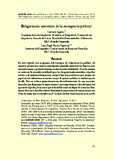| dc.rights.license | http://creativecommons.org/licenses/by-nc-sa/3.0/ve/ | |
| dc.contributor.author | Agelvis, Valmore | |
| dc.contributor.author | Rivero, José Ángel | |
| dc.date.accessioned | 2017-03-06T15:46:51Z | |
| dc.date.available | 2017-03-06T15:46:51Z | |
| dc.date.issued | 2016-01 | |
| dc.identifier.issn | 1856-9927 | |
| dc.identifier.uri | http://www.saber.ula.ve/handle/123456789/43121 | |
| dc.description.abstract | En este artículo nos ocupamos del concepto de beligerancia en política. Al
respecto adjuntamos nuestra investigación específicamente en las disputas que
un sujeto inicia, o pretende iniciar, contra el poder establecido. Nuestro interés
se centra en la narrativa establecida por los dos personajes narrativos: el poder
mismo y el aspirante beligerante, aunque hay tres personajes que juegan un
papel en este subsistema semiótico ya que la opinión pública es también parte
de ella. Esto se traduce generalmente en el establecimiento de una narrativa
de poder que disminuye la importancia o resta importancia a la relevancia del
oponente al poder, de manera que se le señale como no digna de atención. Esto
quiere decir que el poder intenta disminuir la importancia de una persona con
el fin de evitar una contienda con él. La frase Quítate tú pa’ ponerme yo se puede traducir como un mecanismo legítimo de las luchas sociales. En el escenario
discursivo de la beligerancia, el que describe y marca la primera contendiente es
el poder mismo: el Poder tiene la intención de marginar, por todos los medios
posibles, a su contendiente, por lo que la opinión pública indiferente llegará a
conocerlo. La intención del Poder es hacer que el recién llegado en el ámbito
de la lucha por el poder desaparezca de la opinión pública y por esta razón, la
beligerancia es, en primer lugar, un asunto de la comunicación y la energía que
tratan de ignorar y hacer invisibles sus rivales, en caso de que representan una
amenaza real, de modo que no se conviertan en una alternativa a la energía. El
beligerante pretende colocarse a sí mismo como un competidor. | es_VE |
| dc.language.iso | es | es_VE |
| dc.rights | info:eu-repo/semantics/openAccess | |
| dc.subject | Semiótica | es_VE |
| dc.subject | Pasiones | es_VE |
| dc.subject | Fuerza ilocutiva | es_VE |
| dc.subject | Revisión pública | es_VE |
| dc.subject | Narrativas de modalidad | es_VE |
| dc.subject | Poder | es_VE |
| dc.title | Beligerancia: semiótica de la emergencia política | es_VE |
| dc.title.alternative | Belligerence: semiotics of political emergency | es_VE |
| dc.type | info:eu-repo/semantics/article | |
| dc.description.abstract1 | In this paper we address the concept of belligerence in politics. In this
regard specifically we attach our research disputes a subject starts or intends to
initiate against the established power. Our focus is on narrative established by
the two characters: the same power and the belligerent aspirant, although there
are three characters that play a role in this semiotic subsystem as public opinion
is also part of it. This generally results in the establishment of a narrative of
power that diminishes the importance or downplays the relevance of the
opponent to power, so that he point as worthy of attention. This means that
the government is trying to diminish the importance of a person in order to
avoid a fight with him. The phrase Take off your pa ‘I myself can be translated
as a legitimate mechanism of social struggles. In the discourse scenario of
belligerency, which describes and marks the first contender is power itself: the
Power intends to marginalize, by all possible means, to his contender, so the
indifferent public opinion will come to know him. The intention of Power is
to make the newcomer in the field of power struggle disappears from public
opinion and for this reason, belligerence is, first, a matter of communication
and energy trying to ignore and make invisible rivals, if they represent a real
threat, so they do not become an alternative to energy. The belligerent aims
to place itself as a competitor. | es_VE |
| dc.description.colacion | 51-69 | es_VE |
| dc.description.email | valmoreagelvis@gmail.com | es_VE |
| dc.description.email | riverojoseangel@gmail.com | es_VE |
| dc.description.frecuencia | Anual | |
| dc.identifier.depositolegal | PP200908ME20 | |
| dc.publisher.pais | Venezuela | es_VE |
| dc.subject.centroinvestigacion | Centro de Investigaciones en Ciencias Humanas (HUMANIC) | |
| dc.subject.centroinvestigacion | Grupo de Investigaciones sobre Historia de las Ideas en América Latina (GRHIAL) | |
| dc.subject.facultad | Facultad de Humanidades y Educación | es_VE |
| dc.subject.keywords | Semiotics | es_VE |
| dc.subject.keywords | Passions | es_VE |
| dc.subject.keywords | Illocutionary force | es_VE |
| dc.subject.keywords | Public opinion | es_VE |
| dc.subject.keywords | Narrative modality | es_VE |
| dc.subject.keywords | Power | es_VE |
| dc.subject.seccion | Anuario GRHIAL: Artículos científicos | es_VE |
| dc.subject.thematiccategory | Artes y Humanidades | es_VE |
| dc.subject.tipo | Revistas | es_VE |
| dc.type.media | Texto | es_VE |


